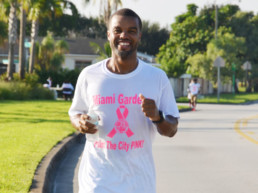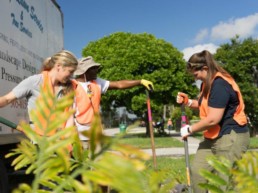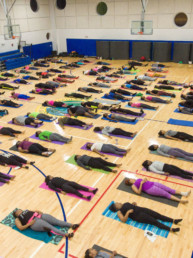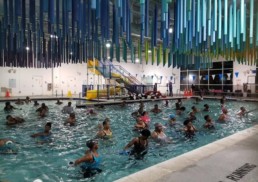Overview
Physical Activity refers to all energy expended by movement. The major contributors are everyday activities that involve moving the body around, such as walking, cycling, climbing stairs, housework, and shopping, with much of it occurring as an incidental part of our daily routines. Exercise, on the other hand, is a planned and purposeful attempt, at least in part, to improve fitness and health. Exercise might include activities such as brisk walking, cycling, aerobics, dance, and perhaps active hobbies such as gardening and competitive sports.
Our initial research conducted in 2014 in the area of physical activity indicated that 51.1% of residents living in the Miami Gardens area hold jobs that are sedentary and 27.3% state they did not have time for physical activity in the past month. Input from surveys and focus groups identified lack of physical activity as the number one community health issue. Based upon what we learned from the community surveys and data, LHMG selected a mix of programmatic and environmental change strategies to expand community opportunities and interest in physical activity. Our focus on environmental changes has been of particular interest and prioritized.
Environmental changes are modifications made to the physical environment that make healthier choices easier. Complete Streets are designed and operated to enable safe access for all users, including pedestrians, bicyclists, motorists and transit riders of all ages and abilities. In particular, we identified Complete Streets policies which ensure community roads are constructed for safe biking, walking and driving.


Strategies
- Increase the number of places that improve community design by connecting safe and accessible places for Physical Activity.
- Increase the number of person in Miami Gardens with safe and accessible places for physical activity.
- Increase access and security in the City of Miami Gardens’ Parks through the implementation of Parks After Dark.
- Support residents’ physical activity by creating Walking & Fitness Groups with a social support component for residents across all age groups.
- Increase physical activity in Miami Gardens’ worksites through a Workplace Wellness project.
- Increase Physical Activity in Miami Gardens’ Out of School programs through the implementation of an evidence based curriculum.
- Work in collaboration with Miami-Dade County Public Schools to help implement, support and reinforce physical activity wellness policies in Miami Gardens schools.
- Implement Safe Routes to School (SRTS) strategies at Miami Gardens schools that will increase students’ opportunities to walk or bicycle to school.
- Increase the capacity of Faith-Based Organizations (FBOs) in Miami Gardens to improve their health promotion efforts through the adoption of policy, systems, environmental, and programmatic changes.


Faith & Wellness Project
Host
MG Safe Routes to School
City Fitness Challenge
Active Transportation Wayfinding Project
Get Moving Miami Gardens
This project will improve the walking experience and increase physical activity in Miami Gardens by collaborating with community members and partners to coordinate permanent changes (funded by City) and install tactical urbanism elements that create an activity-friendly route from City Hall and along NW 187th Street. This project will increase opportunities to be physically active by improving walkability and bikeability through the connection of multiple community assets from City Hall, along NW 187th Street and the surrounding corridors. It was also include the installation of decorated crosswalks and a demonstration park near City Hall. The final result of the project will be the implementation of an activity-friendly route that aligns with the Master Mobility Plan, Entertainment Master Plan, and City's Complete Streets policies. One of the most significant strengths of the project is that it will show the community that high impact/low cost built environment changes can happen in their community that will create a safer and more engaging public space that they can use to improve their physical health and overall well-being. The everyday destination to be connected through this project include City Hall, Carol City High, Carol City Middle, Barbara Hawkins Elementary, Brentwood Park, the Post Office, multiple apartment buildings and residential neighborhoods, West Side Blueway Multi-Use Trail, the City of Miami Gardens trolley, and more. This project will help to highlight to the community that access to everyday destinations can be easily traveled to by active transportation (walking and biking), which can, in turn, improve their physical and mental health.
Bike Mobility
The focus of this project is to enhance bikeability in Miami Gardens. A lot of great work has been done by LHMG, the City of Miami Gardens, and many community partners around increasing bicycling opportunities in the community. This project is another piece of that work and includes connecting with the City of Miami Gardens to brainstorm, plan, and adopt a policy or systems change that enhances bikeability in Miami Gardens. Examples of changes could include looking at how to change funding mechanisms to support bike infrastructure, like bike boulevards or creating other system changes like implementing a bike-share program. This policy or system change would build off the work that has already been completed or is in process: (1) the City's LRTP Complete Streets policies, (2) the projects that are planned are part of the Master Mobility Plan, (3) the development and improvements planned as part of the City's Entertainment District, (4) the Miami-Dade TPO's SMART Plan and first/last mile improvements, and (5) other locally-specific policies and plans. This work will also be guided by input received from Miami Gardens residents during previous projects and include steps to obtain community input with the Miami Gardens Community Liaison(s) and extended LHMG partners.
Accomplishments to Date
- Planted 340 shade trees near walking and biking trails and transit stops to promote physical activity and public transit use, creating wayfinding signs touting the benefits of walking and biking (with help of 200 youth and adult volunteers).
- Incorporated best practices for physical activity and healthy food access into the City’s Comprehensive Development Master Plan, promoting a healthy food system with policies to improve local food access, support urban agriculture, and promote healthy food sales by retailers and restaurants, and promoting physical activity by developing built environment improvements that make active living safer, more convenient and enjoyable (e.g., mixed-use neighborhoods, and improved transit, bicycle, and pedestrian facilities and connectivity).
- Trained and provided seed-funding to 21 after-school sites to adopt national Healthy Eating and Physical Activity (HEPA) Standards.
- Consolidated and prioritized multiple Miami Gardens plans to create a Master Mobility Plan that lays out a comprehensive vision of projects, which promote walking, bicycling, and riding transit, to create a safe environment and increase Miami Gardens residents’ physical activity levels.
- Conducted a walking group pilot project aimed at increasing physical activity and improving social support at the neighborhood level.
- Developed and implemented a Worksite Wellness Program within the City of Miami Gardens in collaboration with the City Manager’s Office and supported three Miami Gardens’ employers in adopting worksite wellness policies and practices, resulting in more than 1,500 employees enrolling in programming to support healthy living.
- Developed a faith-based health initiative that has the potential to be adopted by faith-based organizations within Miami Gardens.
- Worked collaboratively with City of Miami Gardens’ Mayor Oliver Gilbert to activate two rounds of the Mayor’s Fitness Challenge, which engaged more than 1300 residents in the challenges combined. The Challenge is aimed at increasing physical activity and improving healthy food choice.
- Developed a comprehensive Safe Routes to School (SRTS) Plan to improve health by creating a safe environment around schools and promoting the opportunities to walk or bike to school.
- Developed a Streetscape Master Plan to guide improvements within the right of way and develop project strategy to support the City’s efforts to improve pedestrian safety; enhance the pedestrian environment; improve connectivity; and promote a higher quality of life.